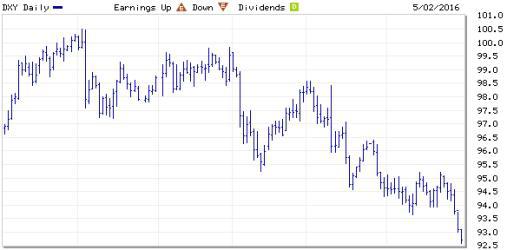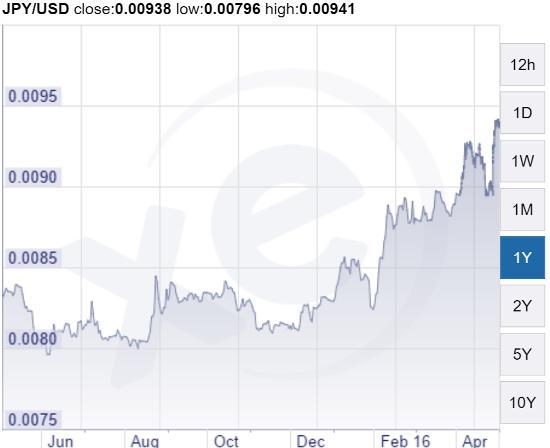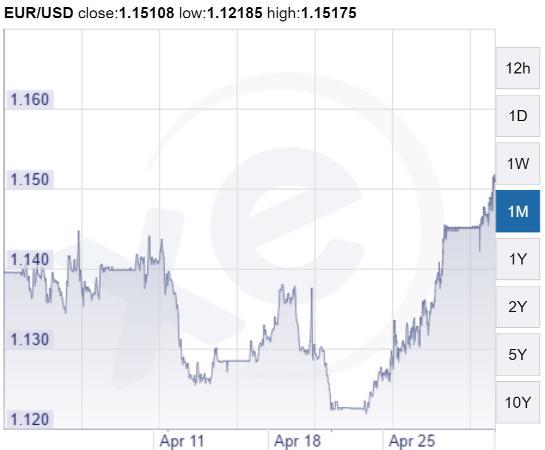A Currency War Battle That Europe and Japan Can’t Afford To Lose
Currencies / Currency War May 03, 2016 - 12:23 PM GMTBy: John_Rubino
 The dollar is tanking lately. From a high of around 100 in December, the dollar index — which measures USD against a basket of foreign currencies — is down about 8%, and the decline is steepening. In counterintuitive currency war terms, that means the US is winning the latest battle.
The dollar is tanking lately. From a high of around 100 in December, the dollar index — which measures USD against a basket of foreign currencies — is down about 8%, and the decline is steepening. In counterintuitive currency war terms, that means the US is winning the latest battle.

After three years of the dollar being pretty much the only strong currency in the world, US corporate profits are falling (because it’s hard to sell things abroad when you price them in an expensive currency) and growth is slowing (because an economy can’t expand if corporate profits are falling). Presumably the plunging dollar will offer some relief on those fronts.
But our relief comes at a high, potentially-catastrophic price for Japan and Europe, because a weak dollar by definition means a strong euro and yen. And those economies are totally unprepared for their exports becoming pricier and therefore harder to move. Here’s what the yen and euro are doing while the dollar is falling:


Japan’s 2016 GDP growth forecast is an anemic 1.2%. The eurozone’s inflation rate is -0.2%. French unemployment is above 10%. The list goes on, but the scariest stats come from Italy where some major banks are trading at less than half of book value, implying that huge loan losses are expected.
This is clearly not the time to tighten monetary policy by raising the value of one’s currency. But that’s exactly what Japan and Europe are doing. And the sense of panic is building:
Italy, Japan urge G7 to spend for growth
(Straights Times) – Italy and Japan want the upcoming summit of Group of Seven (G7) leaders to send a “strong signal” of support for using flexible budget policies to stimulate a slowing global economy, the leaders of the two countries said on Monday (May 2).At the start of a European tour focused on preparations for the summit, Japanese Prime Minister Shinzo Abe said he and his Italian counterpart Matteo Renzi shared a view that an acceleration of structural reforms in leading economies had to be accompanied by greater flexibility on budgetary policies.
“We agreed the G7 should send a strong signal in this sense,” Mr Abe said after talks with Mr Renzi in the Italian leader’s home city, Florence.
Mr Renzi said: “Japan is hosting the G7 at a time of great importance and I am counting a lot on Shinzo Abe’s leadership, particularly on the subject of growth.
“We have an extraordinary need to seize the opportunity presented at the G7 and we will be in the frontline supporting (Japan’s efforts) to make the summit a success.”
So far, calls for massive increases in public spending — paid for with borrowed funds — have met resistance from Germany, which is happy with the status quo and terrified of inflation. But let the yen and euro have another month like the last one and the balance of power will shift from stability to growth.
And don’t forget that the above is happening during a recovery in commodities prices engineered by China borrowing another trillion dollars in Q1. Since no country on Earth can continue to borrow at such a pace without spinning totally out of control, this artificial stimulus will have to end shortly, capping commodities and maybe sending them back down to crisis levels (thus making bank balance sheets even uglier).
Two conclusions are inescapable:
1) No matter what Germany (or for that matter the US) thinks, a policy shift towards aggressive growth, fueled with deficit spending, is inevitable. The alternative is the unraveling of the eurozone and a Japanese death spiral. Once this becomes clear (perhaps via an Italian bank collapse) opposition will evaporate.
2) This will fail miserably because — in case anyone anywhere hasn’t noticed — it’s been tried on a vast scale already and all it did was double, triple, quadruple the amount of debt on the books of the various major economies. It did not produce sustainable growth for the simple reason that debt generates activity in the short run and inhibits activity in the long run. And we’re now living in that long run.
By John Rubino
Copyright 2016 © John Rubino - All Rights Reserved
Disclaimer: The above is a matter of opinion provided for general information purposes only and is not intended as investment advice. Information and analysis above are derived from sources and utilising methods believed to be reliable, but we cannot accept responsibility for any losses you may incur as a result of this analysis. Individuals should consult with their personal financial advisors.
© 2005-2022 http://www.MarketOracle.co.uk - The Market Oracle is a FREE Daily Financial Markets Analysis & Forecasting online publication.



